- Home
- Harlan Ellison
Over the Edge Page 15
Over the Edge Read online
Page 15
They had stepped onto the porch.
“Are you Charles Jackson Ferreno, age nineteen, brown hair, brown eyes, five feet ten, 158 pounds, scar on right inner wrist?”
“Y-yes…why?” he had stammered.
The intrusion of these strangers on a thing as private as his love-making had caused him to falter.
Then they had grabbed him.
“What are you doing? Get your hands off him!” Marie had screamed.
They had flashed an illuminated card at her, and she had subsided into terrified silence before their authority. Then they had taken him, howling, into a flit—black and silent—and whirled him off to the plasteel block in the Nevada desert that had been Central Space Headquarters.
They had hypno-conditioned him to operate the inverspace communicators. A task he could not have learned in two hundred years—involving the billion alternate dialing choices—had they not planted it mechanically.
Then they had prepared him for the ship.
“Why are you doing this to me? Why have you picked me!” he had screamed at them, fighting the lacing-up of the pressure suit.
They had told him. The Mark LXXXII. He had been chosen best out of forty-seven thousand punched cards whipped through its platinum vitals. Best by selection. An infallible machine had said he was the least susceptible to madness, inefficiency, failure. He was the best, and the Service needed him.
Then, the ship.
The nose of the beast pointed straight up into a cloudless sky, blue and unfilmed as the best he had ever known. Then a rumble, and a scream, and the pressure as the ship had raced into space. And the almost imperceptible wrenching as the ship slipped scud wise through inverspace. The travel through the milky pinkness of that not-space. Then the gut-pulling again, and there! off to the right through the port—that bleak little asteroid with its quonset blemish.
When they had set him down and told him about the enemy, he had screamed at them, but they had pushed him back into the bubble, had sealed the pressure-lock, and had gone back to the ship.
They had left The Stone, then. Rushing up till they had popped out of sight around a bend in space.
His hands had been bloodied, beating against the resilient plasteel of the pressure-lock and the vista windows.
He never forgot why he was there.
He tried to conjure up the enemy. Were they horrible slug-like creatures from some dark star, ready to spread a ring of viscous, poisonous fluid inside Earth’s atmosphere; were they tentacled spider-men who drank blood; were they perhaps quiet, well-mannered beings who would sublimate all of man’s drives and ambitions; were they…
He went on and on, till it did not matter in the slightest to him. Then he forgot time. But he remembered he was here to watch. To watch and wait. A sentinel at the gate of the Forever, waiting for an unknown enemy that might streak out of nowhere bound for Earth and destruction. Or that might have died out millenia before—leaving him here on a worthless assignment, doomed to an empty life.
He began to hate. The hate of the men who had consigned him to this living death. He hated the men who had brought him here in their ship. He hated the men who had conceived the idea of a sentinel. He hated the Mark computer that had said:
“Get Charles Jackson Ferreno only!”
He hated them all. But most of all he hated the alien enemy. The implacable enemy that had thrown fear into the hearts of the men.
Ferreno hated them all with a bitter obsession verging on madness itself. Then, the obsession passed. Even that passed.
Now he was an old man. His hands and face and neck wrinkled with the skin-folding of age. His eyes had sunk back under ridges of flesh, his eyebrows white as the stars. His hair loose and uncombed, trimmed raggedly by an ultra-safe shaving device he had not been able to adapt for suicide. A beard of unkempt and foul proportions. A body slumped into a position that fitted his pneumo-chair exactly.
Thoughts played leap-frog with themselves. Ferreno was thinking. For the first time in eight years—since the last hallucination had passed—actually thinking. He sat humped into the pneumo-chair that had long ago formed itself permanently to his posture. The muted strains of some long since over-familiarized piece of taped music humming above him. Was the horrible repetition Vivaldi’s Gloria Mass or a snatch of Monteverdi? He fumbled in the back of his mind, in the recess this music had lived for so long—consigned there by horrible repetition.
His thoughts veered before he found the answer. It didn’t matter. Nothing mattered but the watching.
Beads of perspiration sprang out, dotting his upper lip and the receding arcs of sparse hair at his temples.
What if they never came?
What if they had gone already and through some failure of the mechanisms he had missed them? Even the subliminal persistence of the revolving scanners’ workings was not assurance enough. For the first time in many years he was hearing the scanners again, and did they sound right?
Didn’t…they…sound…a…bit…off?
They didn’t sound right! My God, all these years and now they weren’t working! He had no way of repairing them, no way of getting out of here, he was doomed to lie here till he died—his purpose gone! Oh My God! All these years here nowhere and my youth gone and they’ve stopped running and no-good damned things failing now and the aliens’ve slipped through and Earth’s gone and I’m no good here and it’s all for nothing and Marie and everything…
Ferreno! Good God, man! Stop yourself!
He grabbed control of himself abruptly, lurchingly. The machines were perfect. They worked on the basic substance of inverspace. They couldn’t go wrong, once set running on the pattern.
But the uselessness of it all remained.
His head fell into his shaking hands. He felt tears bubbling behind his eyes. What could one puny man do here, away from all and everyone? They had told him more than one man would be dangerous. They would kill each other out of sheer boredom. The same for a man and a woman. Only one man could remain in possession of his senses, to tickle out the intricate warning on the inverspace communicator.
He recalled again what they had said about relief.
There could be none. Once sealed in, a man had begun the fight with himself. If they took him out and put in another man, they were upping the chances of a miscalculation—and a failure. By picking the very best man by infallible computer, they were putting all their eggs in one basket—but they were cutting risk to the bone.
He recalled again what they had said about a machine in his place.
Impossible. A robot brain, equipped to perform that remarkable task of sorting the warning factors, and recording it on the inverspace communicators—including any possible ramifications that might crop up in fifty years—would have to be fantastically large.
It would have had to be five hundred miles long by three hundred wide. With tapes and back-up circuits and tranversistors and punch-checks that, if laid end to end, would have reached halfway from The Stone to Earth.
He knew he was necessary, which had been one of the things that had somehow stopped him from finding a way to wreck himself or the whole quonset during those twenty-four years.
Yet, it still seemed so worthless, so helpless, no unnecessary. He didn’t know, but he was certain the quonset bubble would inform them if he died or was helpless. Then they would try again.
He was necessary, if…
If the enemy was coming. If the enemy hadn’t already passed him by. If the enemy hadn’t died long ago. If, if, if!
He felt the madness walking again, like some horrible monster of the mind.
He pressed it back with cool argument.
He knew, deep inside himself, that he was a symbol. A gesture of desperation. A gesture of survival to the peoples of Earth. They wanted to live. But did they have to sacrifice him for their survival?
He could not come to an answer within himself.
Perhaps it was inevitable. Perhaps not. Either way, it just happen
ed he had been the man.
Here at this junction of the galaxies; in this spot of most importance; here he was the key to a battle that must someday be fought.
But what if he was wasted? What if they never came? What if there was no enemy at all? Only supposition by the learned ones. Tampering with the soul and life of a human being!
God! The horror of the thought! What if…
A soft buzz accompanied the steady ruby glow from the eye in the ceiling. Ferreno stared, open-mouthed. He could not look up at the eye itself. He stared at the bloody film that covered the walls and floor of the quonset. This was the time he had waited twenty-four years to come!
Was this it? No strident noises, no flickering urgency of the red light. Only a steady glow and a soft buzz.
And at the same time he knew that this was far more effective. It had prevented his death from heart attack.
Then he tried to move. Tried to finger the forty-three keys of the inverspace communicator on the underarm of the pneumo-chair. Tried to translate the message the way it had been impressed sub-cortically in his mind, in a way he could never have done consciously.
He was frozen in his seat.
He couldn’t move. His hands would not respond to the frantic orders of his brain. The keys lay silent under the chair arm, the warning unsent. He was totally incapacitated. What if this was a dud? What if the machines were breaking down from the constant twenty-four years of use? Twenty-four years—and how many men before him? What if this was merely another hallucination? What if he was going insane at last?
He couldn’t take the chance. His mind blocked him off. The fear was there. He couldn’t be wrong, and send the warning now, crying wolf!
Then he saw it, and he knew it was not a dud.
Far out in the ever-dark dark of the space beyond The Stone, he could see a spreading point of light piercing the ebony of the void. And he knew. A calmness covered him.
Now he knew it had not been waste. This was the culmination of all the years of waiting. The privation, the hunger of loneliness, the torture of boredom, all of it. It was worth suffering all that.
He reached under, and closed his eyes, letting his hypno-training take over. His fingers flickered momentarily over the forty-three keys.
That done, he settled back, letting his thoughts rest on the calmed surface of his mind. He watched the spreading points of light in the vista window, knowing it was an armada advancing without pause on Earth.
He was content. He would soon die, and his job would be finished. It was worth all the years without. Without anything good he would have known on Earth. But it was worth all of it. The struggle for life was coming to his people.
His night vigil was finally ended.
The enemy was coming at last.
XENOGENESIS: AN ESSAY
The front door of my home is beautiful beyond the describing of it. Created for me many years ago by two fine sculptors, Mabel and Milon Hutchinson, whose work equals in style and gorgeousness the finest woodworking of Louise Nevelson, it is a construct of “found” woodblocks and assorted other pieces. Mabel is quite, quite old now, but she still lives, tended by some of her most loving students, in Capistrano Beach, California. Milon died in 1977, leaving Mabel alone after fifty years of love. He was seventy-two when he passed over. I admired and loved them both, and the beauty they brought to my life and my home never dims.
One Friday night in 1979, I appeared on a radio show well known in Los Angeles: Hour 25, hosted by Mike Hodel. It’s a science fiction program that covers film and television as well as print media, and on that evening in 1979 I gave my opinion of the first Star Trek movie, which I had seen the night before. It didn’t deserve much kindness, that film, and I was not very kind in my remarks.
After the show, and after Mike and I had gone for our usual pie, coffee and chat at DuPar’s, I came home around one o’clock. It was dark in the entrance way to my home, and I unlocked the beautiful door Mabel and Milon had made for me, entered the house, and closed the door. I went to bed.
Next day was a Saturday, and unusual for my secretary to come in, but she had something to finish, and when she showed up at ten o’clock, she said, “What happened to the front door?”
With a soft, nasty, melting feeling in my chest, I went to the front door and opened it.
In the night, probably while I was still at the radio station, someone had thrown several dozen eggs on that work of art. It took many days to clean off the mess, from the hundreds of surfaces and interstitial crevices. I could not concentrate on writing while the door was wounded. I picked and scoured and worked at it with toothbrushes and polish till the day grew dark. Finally, it came as clean as I could get it, but the egg had dried overnight and today the door remains discolored in some places, scored in others where my cleaning marred the surfaces.
Every time I unlock my front door, I hope that if Mabel comes to visit, it will be at night. For her, in the last years of her life, the art that she and Milon produced is solitary balm for her loss. I could not bear to see her expression if she were to see the ravages done to that important bit of her past. I think of the pithecanthropoid fan who slung those eggs, and I also hope I never find out which one it was.
My friend James Blish died in 1975.
Here is an extract from a letter I wrote to M. John Harrison—Mike Harrison, the brilliant English author of the Virconium novels—on July 31st of that year:
Dear Mike:
By now, of course, you know Jim passed away. I was planning to fly to England to see him. I’d been meaning to do it for almost a year but the usual nonsense work-load and deadlines and personal bullshit prevented the journey. I’d decided I was coming early in August, but when I wrote Jim and Judy, and then followed it up with a phone call earlier this month, Judy told me August might be too late.
I’d dedicated a new book to him. I sent him a copy of the dedication page. He wrote me back about two weeks ago…maybe the last thing he ever did write…I don’t know…and he was so damned tough, so bloody Jim, as he’d always been, saying he was feeling better and he was delighted I was, at last, coming to visit; that I should stay on a long while and we’d catch up on the past few years during which we hadn’t seen or communicated with each other too much. He was thrilled with the dedication to SHATTERDAY and he not only signed my personal copy of AGAIN, DANGEROUS VISIONS that I’d packed up and sent, but he’d been thoughtful enough to get it signed by Josephine Saxton—there on a weekend visit—thereby saving me another transatlantic shipping. Even at the last, in pain, and having difficulty writing, he’d been capable of one more act of friendship and concern: something that had always been his hallmark.
But now he’s gone. And I missed the final appointment. The long and endlessly fascinating conversation Jim Blish held with the world is ended, and I miss him terribly.
Mike replied, and like so many others that dark Autumn, he wanted to share his sorrow at Jim’s death. I wrote him in response on August 12th:
Thanks for the note. I appreciate your words. (How odd: Judy Blish actually sustains the loss, and here are we, getting strokes on the passing of Jim. What miserable little creatures we are, wallowing in other people’s sorrow just to enable us to tolerate our pain.)
I’d thought I had it all contained, and today Judy’s letter came and she said, “Jim loved you. He always said so,” and I fell apart again. I’m not a sentimental type, god knows, but there is some part of me that feels an inconsolable loss at the going of that dear man who taught me so much. Christ, it’s awful.
Within three weeks of my sending that letter to Mike Harrison, I received from New York the most recent (at that time) of a series of hate letters from an unsigned correspondent who had been poisoning my mailbox with his vicious notes for almost two years. His note read, in part:
I understand James Blish died. You know he was a publicity flack for the tobacco industry for many years and I understand he died of cancer of the throat. That’s real poeti
c justice, don’t you think? One more of you phonies down, pretty soon it will be your turn.
For years I did not know who was behind those letters sans name or address, except that they were all postmarked out of New York City and they were obviously from someone who was very familiar with science fiction and fandom, someone who knew what I was doing on a continuing basis, and someone who probably subscribed to Locus.
For years I saved all the letters, in a file labeled “Mr. X.” Then one day in late 1983, it chanced that a piece of mail addressed to The Harlan Ellison Record Collection was shown to me by the then-Director of The Collection, Shelley Levinson. I forget now why she showed me that note, as I seldom see correspondence sent to that arm of The Kilimanjaro Corporation. But when I began reading the letter, I could not see the words, I could see only the typewriter face that suddenly I recognized from protracted and intense scrutiny of Mr. X’s vile communiqués. Peculiarities of some of the letters as they’d been typed seemed familiar. I rushed upstairs to my office and pulled the file. Yes, the “t” had a broken cross-bar; the “q” had a loop filled with gunk that reproduced solid black; the “r” on the machine had settled, appearing slightly below the level of all the other letters.
I checked the membership roster of The Collection and found that Mr. X—whose identity had been sedulously disguised for ten years—was Norman Epstein, who lived at 110 East 36th Street in New York, New York 10016. His phone number was (212) 679–8092. He had been one of the earliest members of The Collection, and had received every newsletter issued by The Collection. Records of purchases showed he had bought first editions of my books at inflated prices.
I called him. Late one night. Very late one night.

 Repent, Harlequin! Said the Ticktockman
Repent, Harlequin! Said the Ticktockman Broken Glass
Broken Glass Other Glass Teat
Other Glass Teat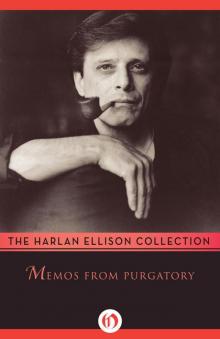 Memos From Purgatory
Memos From Purgatory I Have No Mouth and I Must Scream
I Have No Mouth and I Must Scream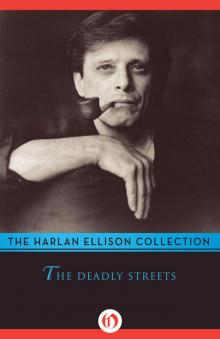 The Deadly Streets
The Deadly Streets The Glass Teat
The Glass Teat Paingod and Other Delusions
Paingod and Other Delusions No Doors No Windows
No Doors No Windows Strange Wine
Strange Wine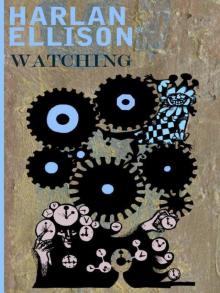 Harlan Ellison's Watching
Harlan Ellison's Watching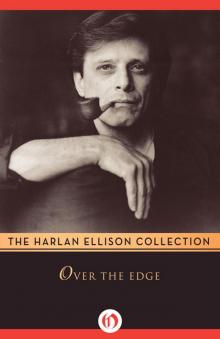 Over the Edge/An Edge in My Voice
Over the Edge/An Edge in My Voice Troublemakers: Stories by Harlan Ellison
Troublemakers: Stories by Harlan Ellison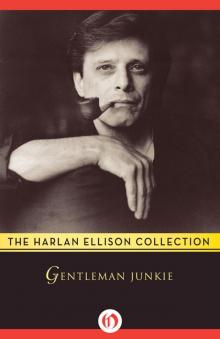 Gentleman Junkie and Other Stories of the Hung-Up Generation
Gentleman Junkie and Other Stories of the Hung-Up Generation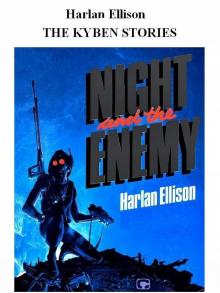 The Kyben Stories
The Kyben Stories From the Land of Fear
From the Land of Fear The Top of the Volcano: The Award-Winning Stories of Harlan Ellison
The Top of the Volcano: The Award-Winning Stories of Harlan Ellison Sleepless Nights in the Procrustean Bed
Sleepless Nights in the Procrustean Bed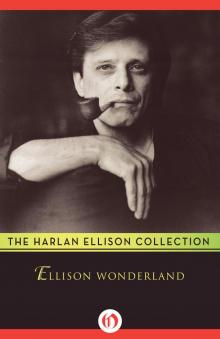 Ellison Wonderland
Ellison Wonderland Children of the Streets
Children of the Streets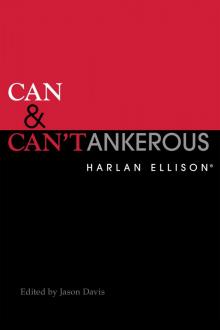 Can & Can'tankerous
Can & Can'tankerous Love Ain't Nothing but Sex Misspelled
Love Ain't Nothing but Sex Misspelled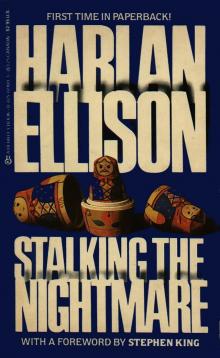 Stalking the Nightmare
Stalking the Nightmare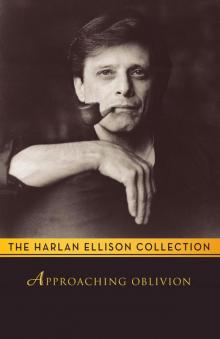 Approaching Oblivion
Approaching Oblivion Deathbird Stories
Deathbird Stories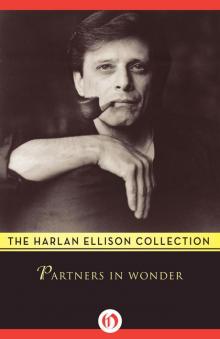 Partners in Wonder
Partners in Wonder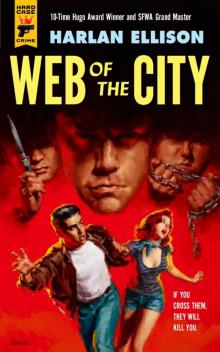 Web of the City
Web of the City Spider Kiss
Spider Kiss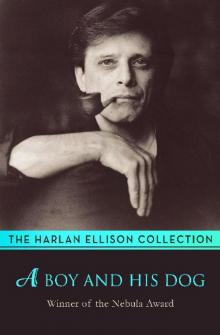 A Boy and His Dog
A Boy and His Dog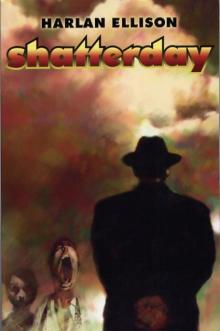 Shatterday
Shatterday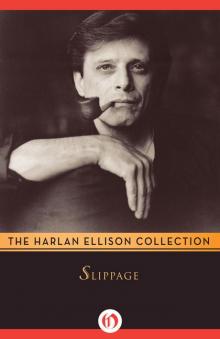 Slippage: Previously Uncollected, Precariously Poised Stories
Slippage: Previously Uncollected, Precariously Poised Stories Repent, Harlequin! Said the Ticktockman
Repent, Harlequin! Said the Ticktockman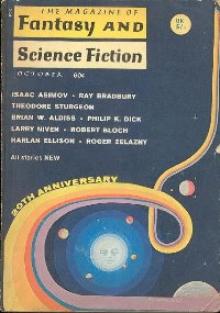 Come to Me Not in Winter's White
Come to Me Not in Winter's White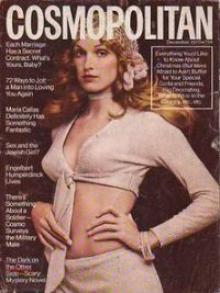 The Song the Zombie Sang
The Song the Zombie Sang The Other Glass Teat
The Other Glass Teat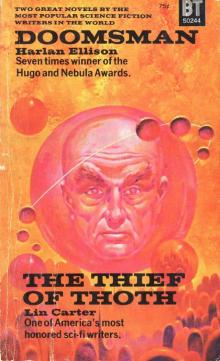 Doomsman - the Theif of Thoth
Doomsman - the Theif of Thoth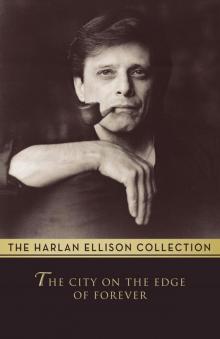 The City on the Edge of Forever
The City on the Edge of Forever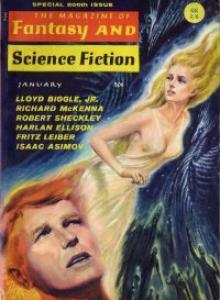 I See a Man Sitting on a Chair, and the Chair Is Biting His Leg
I See a Man Sitting on a Chair, and the Chair Is Biting His Leg The Harlan Ellison Hornbook
The Harlan Ellison Hornbook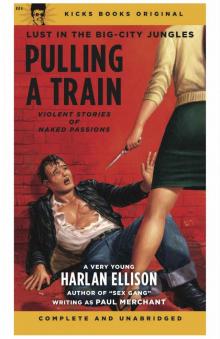 Pulling A Train
Pulling A Train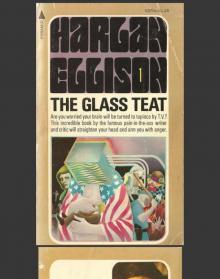 The Glass Teat - essays of opinion on the subject of television
The Glass Teat - essays of opinion on the subject of television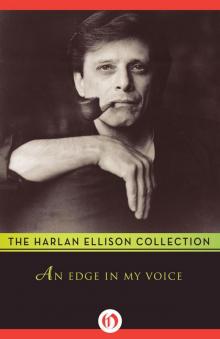 An Edge in My Voice
An Edge in My Voice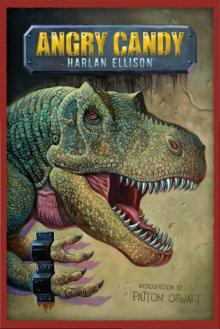 Angry Candy
Angry Candy Troublemakers
Troublemakers The Top of the Volcano
The Top of the Volcano Over the Edge
Over the Edge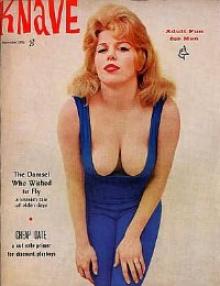 Survivor #1
Survivor #1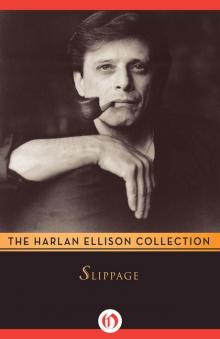 Slippage
Slippage